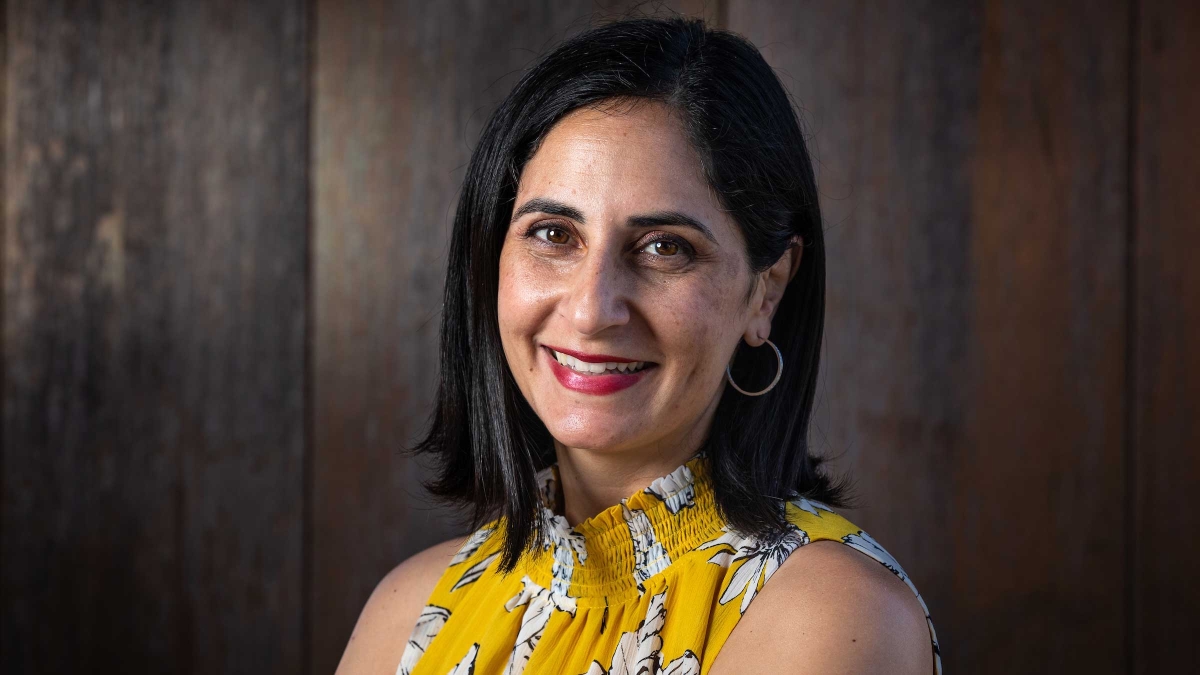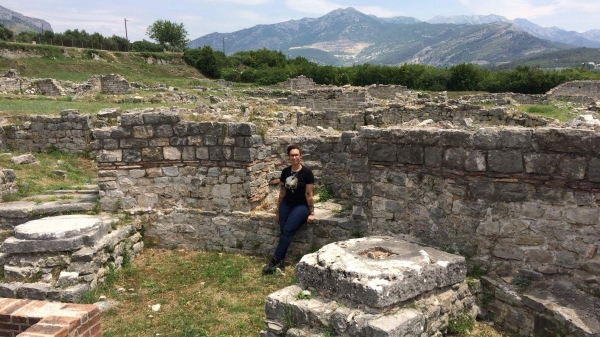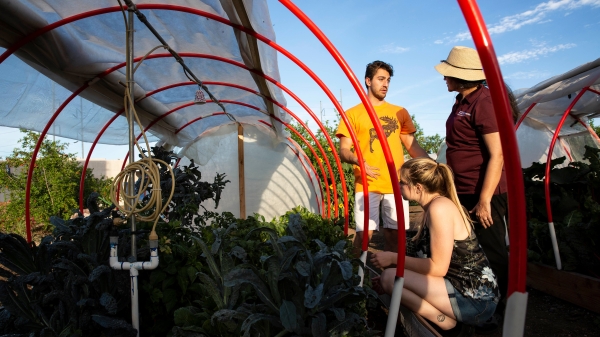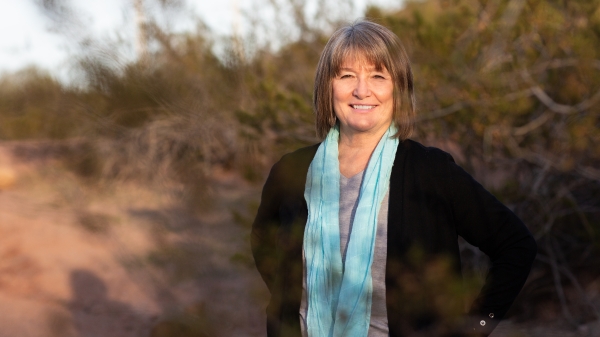Pardis Mahdavi ready for role as head of School of Social Transformation
New director has a desire to think differently, question paradigms and encourage intersectionality

Pardis Mahdavi possesses a deep reservoir of empathy.
That quality makes her a perfect fit for her new position as director of Arizona State University’s School of Social Transformation. Mahdavi has focused her academic career on diversity, inclusion, human trafficking, migration, sexuality, human rights, feminism and public health.
But her compassion comes from a very personal place.
She has faced displacement, discrimination and even the loss of home and country. As an academic researcher, it gives her a special insight into the poor, the disenfranchised and the marginalized.
“My approach to higher education has been informed by my personal journey as an Iranian-American woman growing up in the U.S., as well as my training as an anthropologist where we learn to be reflexive about complex power dynamics,” said Mahdavi, who comes from the Josef Korbel School of International Studies at the University of Denver and assumed her new role on July 1. “All of this inspires a desire to think through things in different ways, to question paradigms, which is why I feel so welcome at ASU.”
ASU Now spoke to Mahdavi about her past, her work and what she hopes to accomplish at the university.
Question: Why ASU and the School of Social Transformation — what drew you here?
Answer: The first time I stepped on campus and visited the School of Social Transformation, I was inspired by how closely my own values aligned with both the school and ASU. My core values coalesce around a series of frameworks that inform how I see the world, and while these values are complicated, for shorthand, I have come to think about them in terms of what I call the “5 I’s”. These are: innovation, interdisciplinarity, intentionality, inclusivity and intersectionality.
If you think about my first “I,” innovation, there is no institution in the world as innovative as ASU, and President (Michael) Crow is known for being intentional — my third “I”! — in moving into a new paradigm for the 21st century. At the School of Social Transformation, we live and breathe values of interdisciplinarity, inclusivity and intersectionality, and I was so happy to know that there is a school out there that lives my values in this way.
Q: What about your own background is important for us to know?
A: I remember growing up my father saying something to me that has stayed with me my entire life. He said to me, “Pardis, remember: They can take everything from you — they can take your home, your belongings, they can even take your country — but the one thing they can never take from you is your education. They can never take your mind.” My family lost everything in the Iranian revolution in the late 1970s. Then in the 1980s, we were living in Minnesota and we faced horrible discrimination there during Iran-Contra and the hostage crisis, so we lost everything again and moved to Southern California. Each time we moved, my father would say this to me. This is what drives me as an educator and as someone who cares about higher education, access and equity. I want to make sure that everyone has a chance to get that which can’t be taken from them.
Q: You recently wrote an article called “The Snowflake Revolution” in which you state today’s youth are much tougher than the media has portrayed them, and they are continuing the work that started in the 1960s. Why do you call them “fearless,” and what happened in the decades in between?
A: Young people today are willing to risk a lot to be heard. They are willing to protest, to put themselves in harm’s way, for what they believe in. This reminds me of students during the civil rights era and the protests of the Vietnam War. Today, we see a lot of students approaching their studies with questions about what learning and what tools they need to make a more just society. I love that students today are interested in connecting themselves, their stories and their learning to larger problems both in the U.S. and around the world.
Q: You’ve also written an op-ed in the Denver Post about how the #MeToo Movement is the start of a new sexual revolution. In what way do you mean?
A: Sexual politics undergirds a lot of social changes that have taken place in the U.S. and around the world. The #MeToo movement brings sexual relations back to the center stage, showing how sexuality can demonstrate some of the most devastating inequalities in our society today. By shedding light on this, we can start to push back, to advocate for gender equality, but not at the expense of racial or sexual equity. The #MeToo movement brings into focus that which many people already knew but didn’t want to talk about — namely the power dynamics that come along with different forms of identities. But I think it’s important to note that #MeToo didn’t happen overnight or in a vacuum. Black and brown women have been talking about gender and sexual violence for years, both in the U.S. and in places like India, Iran, Korea and Nigeria. I think this movement would be stronger if it acknowledged transnational and intersectional ties.
Q: What are you most excited about in the work at ASU and the School of Social Transformation?
A: I can’t believe that I get to be here at a university that is truly trailblazing in every way. I’m excited to be at a place that welcomes change and is committed to meeting the needs of higher education in the 21st century. I am eager to learn from everyone at ASU and the School of Social Transformation about how this innovative spirit infuses all that we do. And I am excited to be here at this moment in world history. I think that now more than ever we need people trained in and thinking about the world’s biggest challenges from interdisciplinary and intersectional perspectives. The programs that we offer at the School of Social Transformation are so needed today, and I think that other universities will want to learn from us about what we are doing and how we are teaching these complex topics. I’m also thrilled to be among such a diverse group of faculty, staff and students. The School of Social Transformation and ASU both are so unique and a road map for the future.
Q: You're an anthropologist, author and former journalist. How would you describe the culture of the School of Social Transformation?
A: Thoughtful and transdisciplinary. At the School of Social Transformation it seems that people have actually transcended the concept of interdisciplinarity and are at the next iteration of it — which is amazing and exactly where we need to be going. People are pushing past disciplinary silos and thinking creatively about new frameworks that aren’t hemmed in by particular disciplinary orthodoxy. The culture here is also extremely open and welcoming. It’s like being in a big family.
The real work of democratic engagement as the School of Social Transformation evolves together will be a challenge, but one that I’m really looking forward to. One of the great things about being a big family is that we are able to weather some storms to make ourselves better. We also care deeply about each other, as well as about the mission of the school and the charter of the university. My parents showed me that family can get us through the toughest challenges in our lives. Family knows our weaknesses but makes us stronger. I’m so honored to be a part of this family now.
Top photo by Charlie Leight/ASU Now
More University news

Anthropology PhD student's work highlights complexity of human identities, histories
Editor’s note: This story is part of a series of profiles of notable spring 2024 graduates. Tisa Loewen considers herself a nontraditional student. She is older than typical U.S. college students,…

New general studies requirements to better prepare ASU students for a changing world
Arizona State University has revamped its general studies requirements — the courses required of all students, regardless of major — to better reflect the interdisciplinary knowledge that students…

ASU professor named AAAS Fellow
The American Association for the Advancement of Science (AAAS), the world’s largest general scientific society and publisher of the Science family of journals, has elected Kaye E. Reed from Arizona…